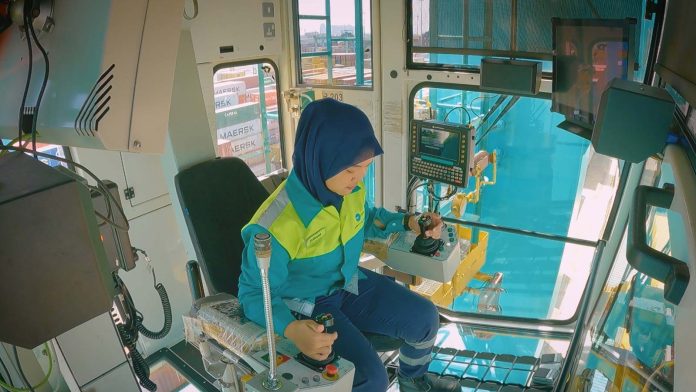
The Port of Tanjung Pelepas in Malaysia is breaking the stereotypes to encourage more women to pursue a career in the port logistics industry.
Port logistics has traditionally been perceived as a male-dominated industry. The usual perception of jobs as “hard labour” has led to the whole sector being considered a workplace unsuitable for women. And if women were working in the industry, they were typically associated with departments such as finance, administration, legal or customer relations, while operations were “reserved” for men.
Negative consequences of such a stereotypical approach have impacted the ability of women to realise their career ambitions in the port logistics industry, and International Maritime Organization (IMO) has been undertaking efforts to promote gender equality and encourage women in the sector. Following these, the Port of Tanjung Pelepas (PTP) has actively engaged in helping the industry move forward and in line with twenty-first-century expectations for equal employment opportunities.
Marco Neelsen, PTP’s Chief Executive Officer, believes that gender equality and diversity are crucial to continued success as Asia-Pacific’s prime transhipment and free zone business hub. Accordingly, through various initiatives, PTP has focused on exploring opportunities to increase the participation of women in both operational and leadership positions.
“Apart from being a melting pot of employees from all backgrounds, including different ethnicities and nationalities, the female talents at PTP are a perfect example of how women continuously challenge the boundaries by working at the desk and being actively involved in operations”, shares Marco Neelsen. “Since its inception in 2000, PTP has always been at the forefront of progressiveness and inclusivity by diversifying the leadership and investing in development programmes and on-the-job experience to accelerate career progression.”
Investing in Talent
To achieve its ambition, PTP has actively worked on various talent enrichment initiatives via academic collaboration with Young Engineer Apprenticeship Programme (YEAP) and Port Operational Planning Apprenticeship Programme (POPA). Through these collaborations, participating young talents, many of them females, are trained and exposed to the complex job dynamics in PTP and learn how to build leadership skills. This will equip them to become better, all-rounded talents in the future and subsequently supplement the port industry with a young graduate talent pool that meets the requirements in the long run.
PTP has also been involved in industry collaborations with various organisations for technical certification training and leadership development programmes, such as Talent Exchange Program and Female Terminal Equipment Operator Fast Track Up-Skilling Program. As part of the latter, selected female operations staff with high potential were enrolled on a specialised training programme that will catapult their careers from prime mover drivers to Quay Crane Clerks, RTG Operators to Quay Crane Operators.
In 2021, in conjunction with the International Women’s Day celebration, PTP successfully unveiled a new fleet of pink prime movers and launched a unique recruitment program called the ‘PTP Female Employee Referral Programme’ (FERF). The unveiling of PTP’s new fleet of pink prime movers represents PTP’s commitment to championing female recruitment initiatives and, most importantly, to acknowledge and celebrate the progress and excellence the female workforce has contributed to the growth and sustainability of PTP.
On the other hand, the Female Employee Referral Programme aims to entice more female talent in Malaysia to join PTP’s workforce. Under the scheme, a special monetary incentive is offered to all PTP employees who introduce potential female candidates to the company, which results in the successful placement of an applicant.
Supportive Work Environment
PTP also understands that bringing talents to work or focusing on upskilling the workforce means nothing if it fails to provide these talents with the best and most conducive work environment. With that in mind, various initiatives and upgrade projects have also been executed, including opening designated rest areas for female staff only and building female prayer rooms, as well as female toilet facilities at the wharf area – small practical things that make a big difference.
Periodic engagement sessions or Women Focus Group forums are scheduled to ensure that female employees can channel ideas, comments or grievances to the management to make their jobs more comfortable. This focus group builds on the existing PTP policies and development opportunities to initiate programmes that contribute to the inclusive and diverse environment in PTP.
Special working arrangements are also in place for female employees working in the terminal. For example, during pregnancy, a female terminal equipment operator is exempted from operating her equipment and will be temporarily transferred to other light-duty responsibilities, such as training new female recruits.
Tangible Results
Today, PTP is reaping the fruit of its efforts to increase the participation and contribution of women in the workplace. PTP’s female workforce currently represents 7%, or around 393 workers, in management and non-management positions. Of this, 266 actively work in operations, engineering, safety and security.
The sight of female employees operating terminal trucks or cranes is now common in PTP. From the longest-serving employee to the first female marine harbour pilot in Malaysia, PTP’s female workforce stands proud and ready to challenge the perception that the port industry belongs to men only.
Siti Sukma Drahman, 28, is one of the many females Prime Mover drivers employed by PTP. For her, working at one of the busiest ports in the world is like a dream come true.
“Growing up, I have always been attracted to all kinds of adventurous activities, as I see such challenges as a motivation to push myself towards betterment. Therefore, I am very grateful to PTP because even though I had never learnt how and never operated any heavy vehicle before, I was still given a chance to prove myself. Therefore, I was even more surprised when I was also told that I would become one of the pioneers of female prime mover drivers in the history of PTP. My journey in PTP has shown that port operations do not require muscle. Although there had been an initial resistance by some of the male staff to the idea of having female drivers working alongside them, as me and other female colleagues proved our mettle, they have since accepted as part of the group. Moving forward, I aspire to become a Rubber Tyred Gantry (RTG) operator and progress further as a Quay Crane Operator (QC) in the future.”
Her friend, Nurul Farhana Madani, 35, works as a Rubber Tyred Gantry Operator.
“Before joining PTP, I worked as a religious teacher, but my interest since childhood has always been physical work. They were shocked when I told my parents that I wanted to quit my teaching job to work with PTP as a Prime Mover Driver. So naturally, my parents were hesitant initially to allow me to pursue my interest, but after some explaining, they understood and fully supported my choice. As an RTG Operator, I need to be fully aware of my surroundings, as any misstep can cause severe consequences. However, even though I chose a high-risk career, I feel comfortable and safe because I’m constantly reminded to be careful by my colleagues or the company.”
Interestingly, it has been documented that the attrition rate among female prime mover drivers is significantly lower compared to their male colleagues. PTP is determined to continue playing an active part in increasing women’s participation for the benefit of female employees, the industry and the nation.
อัพเดตข่าวสารและบทความที่น่าสนใจในอุตสาหกรรมโลจิสติกส์ก่อนใคร ผ่าน Line Official Account @Logistics Mananger เพียงเพิ่มเราเป็นเพื่อน @Logistics Manager หรือคลิกที่นี่













